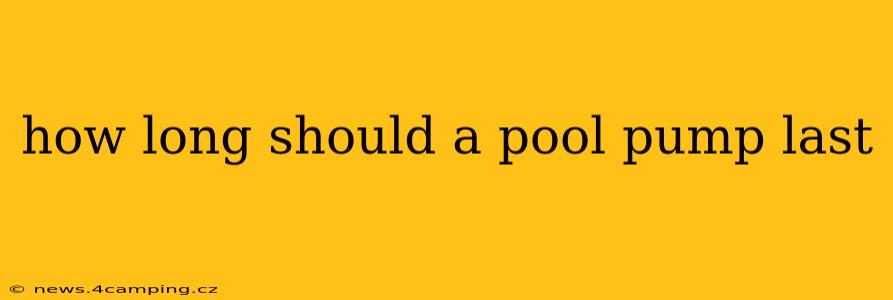Maintaining a sparkling clean and inviting swimming pool involves regular upkeep, and a crucial component of this is your pool pump. But how long can you expect your pool pump to faithfully circulate and filter your pool water? The lifespan of a pool pump isn't a fixed number, but rather depends on several factors. This guide delves into the expected lifespan, factors affecting longevity, and signs indicating it's time for a replacement.
What is the average lifespan of a pool pump?
The average lifespan of a pool pump is 8-12 years, although some may last longer with proper care. This is a general guideline, and several variables can significantly impact this number. Think of it like a car – with proper maintenance, a car can easily surpass its expected lifespan. The same principle applies to your pool pump.
What factors affect the lifespan of a pool pump?
Several factors can influence how long your pool pump will last:
-
Pump Type: Different pump types have varying lifespans. Single-speed pumps generally have a shorter lifespan than variable-speed pumps due to continuous high-speed operation. Variable-speed pumps operate more efficiently and at lower speeds for longer periods, reducing wear and tear.
-
Pump Quality: Higher-quality pumps, typically those with more robust motors and components, tend to last longer. Investing in a premium pump upfront might save you money in the long run.
-
Maintenance: Regular maintenance is paramount. This includes cleaning the pump basket frequently to prevent debris buildup, lubricating motor bearings (if applicable), and ensuring proper plumbing connections. Neglecting maintenance accelerates wear and tear, leading to premature failure.
-
Usage: The frequency and intensity of pump operation also play a role. A pump running constantly at high speed will wear out faster than one used intermittently at lower speeds.
-
Environmental Factors: Exposure to harsh weather conditions, like extreme temperatures and direct sunlight, can degrade the pump's components over time.
How can I extend the life of my pool pump?
Proactive maintenance is key to extending the life of your pool pump:
-
Regular Cleaning: Clean the pump basket regularly to remove leaves, twigs, and other debris. A clogged basket forces the pump to work harder, leading to premature wear.
-
Inspect and Lubricate (if applicable): Inspect the pump for any leaks, cracks, or unusual noises. If your pump has oil lubricated bearings, follow the manufacturer's instructions for lubrication. This is less common in newer, sealed pumps.
-
Check the impeller: The impeller is a critical component. Ensure it's not damaged or worn. A damaged impeller can reduce efficiency and increase strain on the motor.
-
Prevent overheating: Make sure there's adequate airflow around the pump to prevent overheating.
-
Proper plumbing: Ensure your plumbing is properly sized and free of leaks. Improper plumbing can put extra strain on the pump.
What are the signs that my pool pump needs replacing?
Several signs indicate your pool pump may be nearing the end of its life:
-
Unusual Noises: Loud humming, grinding, or clicking sounds are warning signs of internal problems.
-
Reduced Flow: If you notice a significant decrease in water flow through the filter, it might indicate a failing pump.
-
Leaks: Leaks around the pump housing or seals are a serious issue requiring immediate attention.
-
Overheating: If the pump motor frequently overheats, it's a clear sign of a problem.
-
High energy consumption: A failing pump often uses more energy than usual. Monitor your electricity bill.
How much does it cost to replace a pool pump?
The cost of replacing a pool pump varies widely depending on the pump's size, type, and brand. Expect to pay anywhere from a few hundred to over a thousand dollars for a replacement.
What type of pool pump should I buy?
Choosing the right pool pump depends on several factors, including the size of your pool, your budget, and your desired energy efficiency. Variable-speed pumps are generally more efficient and longer-lasting but more expensive upfront. Consult a pool professional for personalized advice.
By understanding the factors influencing the lifespan of your pool pump and practicing regular maintenance, you can significantly extend its life and save money in the long run. Remember, a properly functioning pump is crucial for maintaining a clean, healthy, and enjoyable swimming pool.
